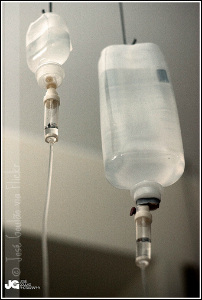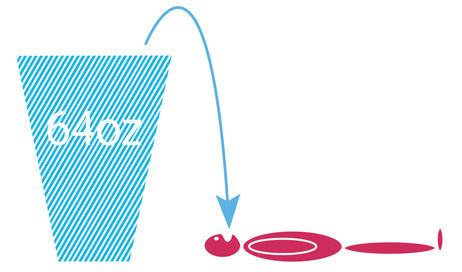|
Okay, I'm going to try not to ramble too much here. I had another post planned, but this topic of water consumption in pregnancy has been bugging me the past few days. Probably because it seems that every time a pregnant women has a pregnancy issue, I hear the same refrain from well-meaning doulas, midwives, doctors, and family members. And it's not evidence-based. It's just not. At worse, it's downright DISEMPOWERING. "DRINK MORE WATER". Tired? Drink more water. Stressed out? You're dehydrated. Braxton Hicks? How much water are you drinking? Hungry? You're not really hungry, you're thirsty. Low amniotic fluid? OMG You need GALLONS of water immediately! Even though doulas are usually very careful about NOT giving medical advice to women, even those that are their clients, I worry about this mantra, because, like anything in life, there IS too much of a good thing. Even with water consumption. Here are some of my thoughts. I googled "how much water should I drink when pregnant?", and here are some of the answers that I found.
So we've seen anything from 64 ounces of fluid, to 96 ounces of water a day recommended in pregnancy. Most of these recommendations seem to be jumping off of the "8-8ounce glasses a day", plus extra for the pregnancy. But where did that initial recommendation come from anyway? It must have been based on some evidence, right? Not so much, as it turns out. Turns out, as revealed in an editorial in the British Medical Journal in 2011, this myth of 64 ounces of water a day was likely created by the bottled-water industry and has been debunked now for several years. The idea of drinking a prescribed amount of water every day may go back as far as the 1940's, but was never based on any science...just a guess by a nutritionist. This researcher believes that "water AND a well-balanced diet" is the key to health. Baked potatoes, oatmeal, soups, and dairy all contain water AND nutrients that help our cells to maintain a proper balance of fluids and minerals, including salt. He adds, "There's no evidence you need to drink more water than what thirst dictates." Drink When You Are Thirsty. Yes, Even if You're Pregnant I believe these two things. One: our bodies are smart. Two: science usually backs this up. Turns out, this subject of water consumption is NO different. Studies show that our bodies are actually very good at keeping our fluid levels balanced, IF WE ARE LISTENING TO IT. Our schedules are often very busy, but pregnant women should especially pay attention to if they are hungry or thirsty, because yes, dehydration can cause contractions and even preterm labor if it gets very serious. Stomach viruses during pregnancy or food poisoning can be dangerous for this reason, but this is not the problem for most pregnant women. However, drinking liters of water, as I often see advised, is also not without risk. Drinking excess water, without food or minerals (and salt) lowers your metabolic rate, and may make your kidneys work harder to get rid of the excess fluid. Did you know that it is possible to die of overhydration? And ironically, the symptoms of "water intoxication" are very similar to the symptoms of dehydration. From Wikipedia, some of the first symptoms of overhydration are " headache, personality changes, changes in behavior, confusion, irritability, and drowsiness". As it progresses, excessive urination and unquenchable thirst also manifest. I've actually seen pregnant women complain of these symptoms, and STILL be advised by well-meaning friends to "drink MORE water". This can be dangerous advice. I don't pretend to know if any mothers or babies have been harmed directly by the advice to drink gallons of water (yes I've seen that amount suggested, even by care providers), but it is wise to realize that there are risks associated with drinking too much water, and even if no physical harm results, I believe that there women are being given a confusing message. "Your body is amazing and it knows just how to give birth and somehow a person will come out of your vagina if you just LISTEN to it.....but it doesn't know how to do something as basic as maintain a balance of fluid...so DRINK MORE WATER. Because you're always a step away from dehydration, you know." Isn't that a little confusing? It doesn't have to be that way. I'm putting the myth of excessive water consumption for pregnant women to rest. YOUR BODY IS SMART. Listen to it. Eat when you're hungry, drink when you're thirsty. Eat and drink whole foods, including dairy, eggs, fruits, veggies, soups, etc. If you are having lots of braxton-hicks contractions towards the end of pregnancy, try and Epsom salt bath instead of ingesting loads of water. Epsom salts are magnesium, which many of us are deficient in and is not found in purified water, and may help your muscles (and uterus!) relax so that you can have relief. I also recommend This article by Matt Stone on why you shouldn't aim for colorless pee!  What About Low Amniotic Fluid? Even though this post is getting long, I felt like I had to address this topic. If a late-term ultrasound diagnoses "low amniotic fluid", many women will feel pressured by their care providers to induce labor, even if there are no other indications of a problem. A study of opinion on obstetricians found that 95% felt that "isolated" diagnosis of low amniotic fluid was an indication for induction (reference here). In this instance, again, well-meaning friends and doulas might suggest that a mother drink liters or a gallon of water and test again. While it's true that studies have shown that maternal hydration affects the amniotic fluid level, there is a problem with this approach. First of all, the diagnosis of low fluid is not NOT particularly reliable. It's actually very difficult to measure the volume of fluid around a baby inside the uterus. If you can imagine looking down at a bathtub with a person in it, and from that angle only trying to determine how much fluid was around him....it's kind of like that. Secondly, studies have shown that the mother's fluid intake affects the amniotic fluid level....but there isn't a consensus on what "normal" fluid levels really are. And most studies have shown that babies do just fine even if NOT induced, even if the fluid is low (but no other risk factors are present). It makes sense that fluid levels would increase. What happens when we drink tons of water? We have to pee! This is what the baby also has to do when confronted with excessive fluid. However, is there evidence that this inflation of fluid is more beneficial than whatever the level was before? That information is not clear. Also, it's known that fluid levels decrease naturally as birth becomes imminent. Fluid levels tend to decrease in the 14 days or so before birth, as the baby swallows more fluid, and urine output decreases. This study showed that in the 11% of women diagnosed with isolated low fluid, there were no differences in outcomes for babies that were allowed to continue gestating vs. babies who were induced. The group of women that were induced had a higher risk of cesarean, and lower-birthweight babies, but no increased risk for those babies was found. Okay, so here is what we have established. The diagnosis of low fluid is not reliable, and there is no easy way to see how much fluid is really inside the uterus. Mother's fluid intake does affect the amniotic fluid, but fluid levels are dynamic and always changing, so taking one measurement doesn't necessarily indicate a problem for the baby. Fluid levels decrease naturally towards the end of pregnancy. No study of isolated low fluid at the end of pregnancy has established a clear risk to waiting for labor to start naturally, and induction of labor may increase risks for the mother. So, given all of this information, it is up to the mother to decide if she would like to aggressively "treat" the low fluid levels with lots of hydration. She should not feel pressured to give in to an induction, since there is no evidence that this has any benefit for the baby. In contrast, several studies showed an increase in cesarean section for mothers that were induced. It's possible that drinking a lot of fluid will increase the "measurement" of fluid around the baby by ultrasound, but since this is NOT a reliable indication of fluid levels, it's really all about how the pregnant mother feels about what is going on. She shouldn't be scared into drinking a bunch of water OR induction for a diagnosis of low fluid because the evidence simply isn't there that these interventions are beneficial. For more details on oligohydramnios (low amniotic fluid) see this excellent article on Science and Sensibility.
8 Comments
Marcie
4/10/2014 06:08:12 am
In your post you state "If you are having lots of braxton-hicks contractions towards the end of pregnancy, try [*] and Epsom salt bath instead of ingesting loads of water. Epsom salts are magnesium, which many of us are deficient in and is not found in purified water, and may help your muscles (and uterus!) relax so that you can have relief."
Reply
Beyond Birth Support
4/10/2014 09:16:49 am
Hi Marcie :) Magnesium is an essential mineral that has been largely unappreciated. This article outlines some benefits of magnesium, one of which is to relieve severe PMS symptoms.
Reply
Beyond Birth Support
4/10/2014 09:17:57 am
and sorry, I don't know why my links didn't work!
Reply
Marcie
4/10/2014 10:34:32 am
The link about magnesium sulfate being used for preterm labor refers to IV administration, not through bathing in it. I don't think the two can be compared adequately without sufficient evidence.
Reply
Beyond Birth Support
4/10/2014 01:06:09 pm
I feel like we're quibbling over something that wasn't even the point of my post.
Reply
12/12/2014 12:00:19 pm
What a good point about the importance of trusting your body. It's sad how many "facts" started as little more than advertising propaganda.
Reply
Tiffany Parrish
11/15/2016 08:02:53 pm
Thank you for the info on magnesium! And in too much water!
Reply
Leave a Reply. |
Author- Sara
I look at birth from the perspective that our bodies are wonderfully made, and if we really believe that and work with the birth process and nourish our bodies properly, they will function optimally, most of the time! Archives
November 2019
Categories
All
|

 RSS Feed
RSS Feed
